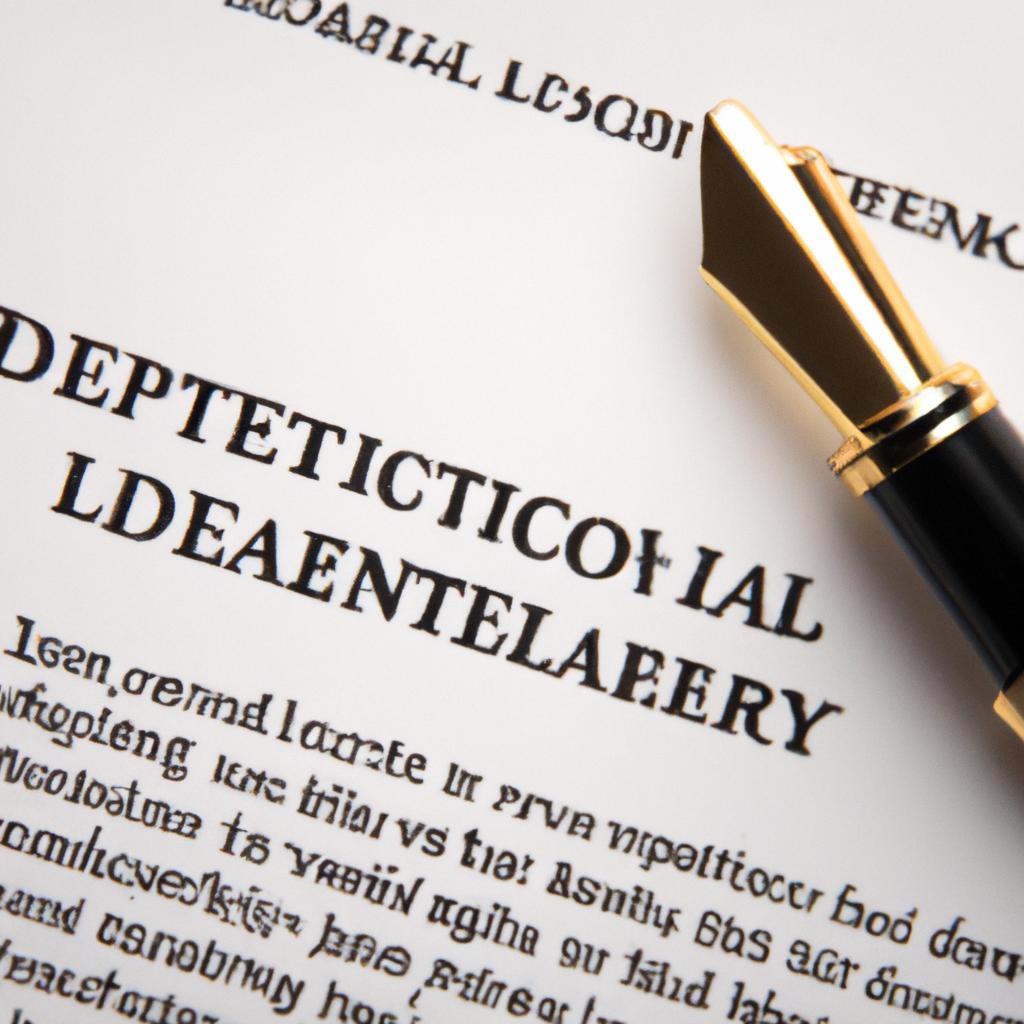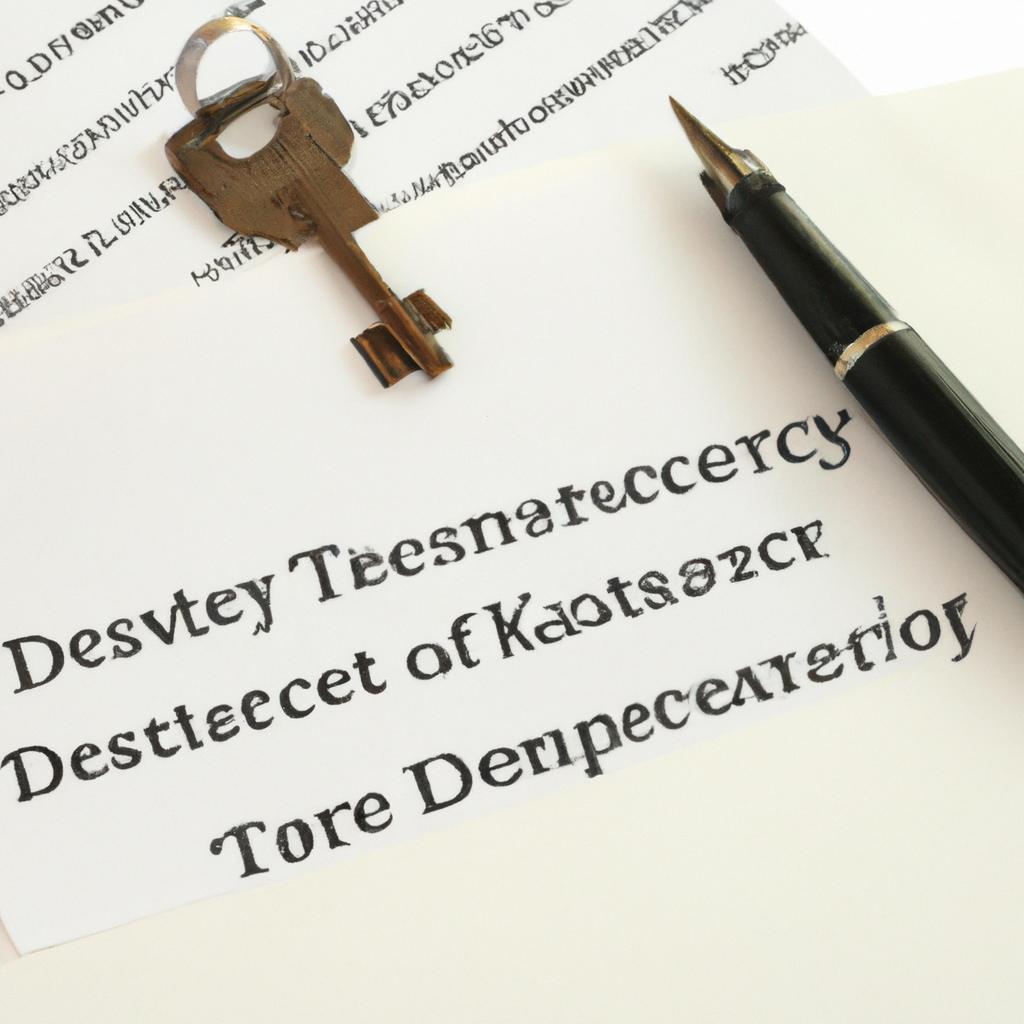Acquiring legal ownership of a property is a significant milestone in any individual’s life, one that carries a weight of responsibility and privilege. As experienced legal professionals at Morgan Legal Group in New York City, we understand the complexities and importance of obtaining a deed to a property. In this article, we will delve into the essential steps and considerations involved in the process of securing a deed, ensuring that you are equipped with the knowledge and guidance necessary to navigate this crucial aspect of property ownership. Whether you are a first-time homeowner, a seasoned investor, or simply seeking to transfer ownership, our expertise in estate planning, probate, elder law, wills, and trusts will provide you with the comprehensive support needed to successfully obtain a deed to your property.
Understanding the Importance of a Deed in Property Ownership
When it comes to property ownership, having a deed is essential to establish legal ownership rights. A deed is a legal document that identifies the owner of a property and serves as proof of ownership. Without a deed, there is no legal record of who owns the property, leaving it vulnerable to disputes and challenges. is crucial for protecting your investment and ensuring your rights as a property owner.
Obtaining a deed to a property involves a series of legal steps and documentation. To obtain a deed, you must first identify the type of deed you need, whether it be a warranty deed, quitclaim deed, or special warranty deed. Next, you must gather the necessary information and documentation, such as a property description, purchase agreement, and title search. Once all the required documents are in order, you can then proceed to have the deed prepared and executed in accordance with state and local laws. It is always recommended to seek legal advice from a qualified attorney to ensure that the deed is properly executed and recorded in the appropriate government office.

Navigating the Legal Process of Acquiring a Deed for a Property
When it comes to acquiring a deed for a property, there are several important steps that must be followed in order to navigate the legal process successfully. One of the first steps in obtaining a deed is to conduct a thorough title search to ensure that the property is free and clear of any liens or claims. This will help to establish a clear chain of ownership and avoid any potential disputes in the future.
Once the title search has been completed, the next step is to prepare the necessary legal documents, including a deed of conveyance. This document will transfer ownership of the property from the current owner to the buyer, and must be signed and notarized in order to be legally binding. It is important to consult with a qualified real estate attorney to ensure that all documents are prepared correctly and that the transfer of ownership is conducted in accordance with state and local laws.

Key Considerations When Transferring a Deed to Secure Property Ownership
When transferring a deed to secure property ownership, it is essential to consider several key factors to ensure a smooth and legally binding transaction. One of the most crucial aspects of transferring a deed is ensuring that the document is properly executed and recorded. This involves following the necessary legal procedures and requirements, including obtaining the necessary signatures and notarizations.
Additionally, it is important to conduct a thorough title search to verify the ownership and history of the property. This will help identify any potential issues or claims that could affect the transfer of ownership. It is also essential to consider the tax implications of transferring a deed, as this can have significant financial consequences. Seeking professional legal advice and assistance from a qualified attorney can help navigate the complexities of transferring a deed and ensure that the process is carried out effectively and legally.

Expert Recommendations for Safeguarding Your Property Rights through Deed Acquisition
In order to safeguard your property rights through deed acquisition, it is crucial to follow expert recommendations to ensure a smooth and legally sound process. One of the first steps to obtaining a deed to a property is to conduct thorough research on the property’s history and ownership. This includes examining previous deeds, titles, and liens to verify the property’s chain of ownership and ensure there are no existing legal disputes.
Once you have gathered all necessary information, it is important to consult with a qualified real estate attorney who can guide you through the deed acquisition process. A legal professional can help you draft and execute the necessary legal documents, such as a deed of conveyance or a quitclaim deed. Additionally, working with a lawyer can provide you with valuable legal advice and protection to ensure that your property rights are properly protected.
Q&A
Q: What exactly is a deed to a property?
A: A deed is a legal document that transfers ownership of a piece of real estate from one party to another.
Q: Why is it important to have a deed to a property?
A: Having a deed is crucial as it serves as proof of ownership of the property and is necessary for any future sales or transfers of the property.
Q: How can I obtain a deed to a property?
A: You can obtain a deed by purchasing a property through a real estate transaction, inheriting property through a will, or receiving a gift of property from someone else.
Q: What information is typically included in a deed?
A: A deed typically includes the names of the parties involved, a legal description of the property, the purchase price (if applicable), and any restrictions or easements that may apply to the property.
Q: Are there different types of deeds?
A: Yes, there are several types of deeds including warranty deeds, quitclaim deeds, and special warranty deeds. Each type of deed offers different levels of protection for the buyer.
Q: Can I change the information on a deed?
A: It is possible to amend a deed through a process known as a deed correction. However, it is important to consult with a real estate attorney to ensure the changes are made correctly and legally.
Q: How long does it take to receive a deed?
A: The process of obtaining a deed can vary depending on the type of transaction and the local government’s processing times. In some cases, you may receive a deed shortly after the closing of a real estate transaction, while in other cases, it may take a few weeks or longer.
To Wrap It Up
Obtaining a deed to a property is a crucial step in establishing ownership and securing your investment. By following the steps outlined in this article, you can navigate through the process with confidence and clarity. Remember, legal procedures may vary depending on your location, so it’s always best to consult with a professional for personalized guidance. With your deed in hand, you can rest assured knowing that your property rights are officially recognized. So go ahead, take the necessary steps to secure your deed and enjoy the peace of mind that comes with it. Happy homesteading!
 Obtaining a deed to a property is an important step in the home ownership process. A deed is a legal document that proves ownership of a property and is necessary for transferring ownership of the property from one person to another. Whether you are buying a new home or inheriting a property, understanding how to obtain a deed is crucial. In this article, we will discuss the process of obtaining a deed to a property and provide useful tips to make the process smoother.
Obtaining a deed to a property is an important step in the home ownership process. A deed is a legal document that proves ownership of a property and is necessary for transferring ownership of the property from one person to another. Whether you are buying a new home or inheriting a property, understanding how to obtain a deed is crucial. In this article, we will discuss the process of obtaining a deed to a property and provide useful tips to make the process smoother.
Before we dive into the steps of obtaining a deed, let’s first understand the different types of deeds and what they mean.
Types of Deeds:
1. Warranty Deed: This type of deed guarantees the grantor (seller) owns the property and has the right to sell it. It also ensures that the property is free from any encumbrances or titles that could affect the ownership.
2. Quitclaim Deed: Unlike a warranty deed, a quitclaim deed does not guarantee the grantor’s ownership of the property. It simply transfers any rights or interests the grantor has in the property to the grantee (buyer). This type of deed is commonly used to transfer property between family members or during a divorce.
3. Grant Deed: This deed transfers the grantor’s interest in the property to the grantee. It guarantees that the property has not been sold to anyone else and is free from any liens or encumbrances.
Now that we have a basic understanding of the different types of deeds, let’s look at the steps involved in obtaining a deed to a property.
Step 1: Determine the type of deed you need
The first step in obtaining a deed is determining the type of deed that is needed for your specific situation. As we discussed earlier, there are different types of deeds, and the one you need will depend on the circumstances of the property transfer. If you are purchasing a property, a warranty deed is usually required. If you are inheriting a property, a grant deed or quitclaim deed may be more appropriate. Consulting with a real estate attorney can help you determine the right type of deed for your situation.
Step 2: Gather necessary documents and information
To obtain a deed, you will need to provide the necessary documents and information to support the transfer of the property. This may include a copy of the current deed, legal description of the property, and evidence of ownership. If you are purchasing the property, you will also need to provide a copy of the purchase agreement and any financing documents.
Step 3: Draft the deed
Once you have gathered all the necessary documents and information, the next step is to draft the deed. This is a legal document, so it is best to seek the help of a real estate attorney or a title company to ensure that all necessary information is included and that the deed follows state laws and regulations.
Step 4: Sign the deed
After the deed has been drafted, it must be signed by both the grantor and the grantee in the presence of a notary public. The notary public will verify the identities of the parties and ensure that they are signing the deed willingly.
Step 5: Transfer the deed
The final step in obtaining a deed is to transfer it to the proper authorities. This may include recording the deed at the county recorder’s office or filing it with the appropriate court. The exact process will vary depending on your state’s laws and regulations.
Tips for obtaining a deed:
– It is always a good idea to consult with a real estate attorney to ensure that you are following all legal requirements and that the deed is properly drafted.
– If you are purchasing a property, it is important to conduct a title search to ensure there are no issues or claims on the property that could affect your ownership in the future.
– Keep copies of all documents involved in the transfer of the property, including the deed, purchase agreement, and any financing documents.
– If you are inheriting a property through a will or trust, it is best to work with an estate planning attorney who can guide you through the process of transferring ownership and obtaining a deed.
Benefits of obtaining a deed:
– A deed provides legal proof of ownership, giving you full rights to the property.
– It ensures that the transfer of ownership is properly recorded and recognized by the government.
– A deed can protect you from potential disputes over ownership in the future.
In conclusion, obtaining a deed to a property is an essential step in the home ownership process. By following the steps outlined in this article and seeking the guidance of a real estate attorney, you can ensure a smooth and legal transfer of ownership. Remember to gather all necessary documents, determine the type of deed needed, and properly record the transfer of ownership to protect your rights and interests in the property.

